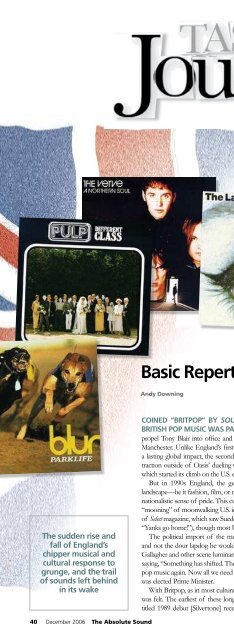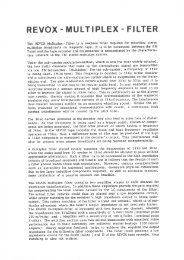You also want an ePaper? Increase the reach of your titles
YUMPU automatically turns print PDFs into web optimized ePapers that Google loves.
Basic Repertoire: Britpop<br />
Andy Downing<br />
The sudden rise and<br />
fall of England’s<br />
chipper musical and<br />
cultural response to<br />
grunge, and the trail<br />
of sounds left behind<br />
in its wake<br />
Coined “Britpop” by Sound magazine in the late 1980s, the second wave of<br />
British pop music was part of a U.K. cultural and musical revolution that helped<br />
propel Tony Blair into office and made global stars out of a couple of pint-swilling, blue-collar blokes from<br />
Manchester. Unlike England’s first artistic outburst, where artists like the Beatles and the Rolling Stones made<br />
a lasting global impact, the second coming was more or less an afterthought in the United States, gaining little<br />
traction outside of Oasis’ dueling Gallagher brothers and “Song 2,” an accidental hit by scene originators Blur,<br />
which started its climb on the U.S. charts when the movement was well into its death throes.<br />
But in 1990s England, the genre was of immense significance. With America dominating the artistic<br />
landscape—be it fashion, film, or music—a generation of young Brits began pulling away and exhibiting a more<br />
nationalistic sense of pride. This cultural backlash revealed itself in ways both subtle (Pulp singer Jarvis Cocker’s<br />
“mooning” of moonwalking U.S. icon Michael Jackson at the 1996 Brit Awards) and obvious (April 1993’s cover<br />
of Select magazine, which saw Suede’s Brett Anderson posing with a Union Jack background alongside the phrase<br />
“Yanks go home!”), though most U.S. citizens were unaware of the hubbub.<br />
The political import of the music is more easily catalogued, as Blair, then a young, fresh-faced politician<br />
and not the dour lapdog he would become, latched onto the music, posing for photographs with Oasis’ Noel<br />
Gallagher and other scene luminaries. In 1996, Blair’s press secretary, Alastair Campbell, even issued a statement<br />
saying, “Something has shifted. There’s a new feeling in the streets. There’s a desire for change. Britain is exporting<br />
pop music again. Now all we need is a new government.” Campbell’s vision came to fruition in 1997 when Blair<br />
was elected Prime Minister.<br />
With Britpop, as in most cultural movements, the first warning shots were fired long before the initial impact<br />
was felt. The earliest of these long-range missiles was delivered by Manchester’s Stone Roses. The band’s selftitled<br />
1989 debut [Silvertone] received near-unanimous praise from the British music press for songs like “I<br />
40 December 2006 The Absolute Sound










